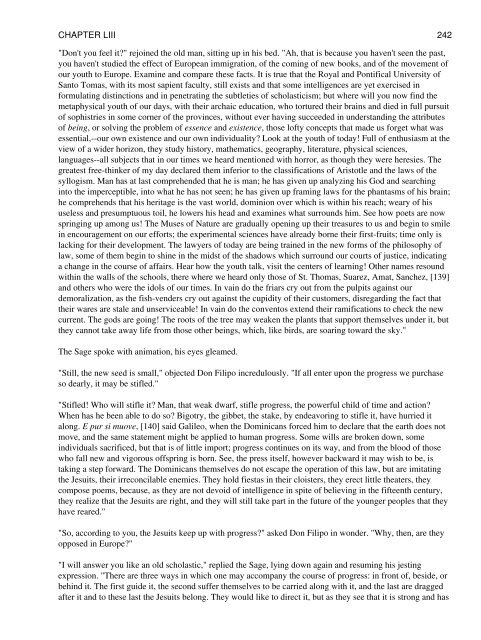The Social Cancer, by José Rizal - Home
The Social Cancer, by José Rizal - Home
The Social Cancer, by José Rizal - Home
You also want an ePaper? Increase the reach of your titles
YUMPU automatically turns print PDFs into web optimized ePapers that Google loves.
CHAPTER LIII 242<br />
"Don't you feel it?" rejoined the old man, sitting up in his bed. "Ah, that is because you haven't seen the past,<br />
you haven't studied the effect of European immigration, of the coming of new books, and of the movement of<br />
our youth to Europe. Examine and compare these facts. It is true that the Royal and Pontifical University of<br />
Santo Tomas, with its most sapient faculty, still exists and that some intelligences are yet exercised in<br />
formulating distinctions and in penetrating the subtleties of scholasticism; but where will you now find the<br />
metaphysical youth of our days, with their archaic education, who tortured their brains and died in full pursuit<br />
of sophistries in some corner of the provinces, without ever having succeeded in understanding the attributes<br />
of being, or solving the problem of essence and existence, those lofty concepts that made us forget what was<br />
essential,--our own existence and our own individuality? Look at the youth of today! Full of enthusiasm at the<br />
view of a wider horizon, they study history, mathematics, geography, literature, physical sciences,<br />
languages--all subjects that in our times we heard mentioned with horror, as though they were heresies. <strong>The</strong><br />
greatest free-thinker of my day declared them inferior to the classifications of Aristotle and the laws of the<br />
syllogism. Man has at last comprehended that he is man; he has given up analyzing his God and searching<br />
into the imperceptible, into what he has not seen; he has given up framing laws for the phantasms of his brain;<br />
he comprehends that his heritage is the vast world, dominion over which is within his reach; weary of his<br />
useless and presumptuous toil, he lowers his head and examines what surrounds him. See how poets are now<br />
springing up among us! <strong>The</strong> Muses of Nature are gradually opening up their treasures to us and begin to smile<br />
in encouragement on our efforts; the experimental sciences have already borne their first-fruits; time only is<br />
lacking for their development. <strong>The</strong> lawyers of today are being trained in the new forms of the philosophy of<br />
law, some of them begin to shine in the midst of the shadows which surround our courts of justice, indicating<br />
a change in the course of affairs. Hear how the youth talk, visit the centers of learning! Other names resound<br />
within the walls of the schools, there where we heard only those of St. Thomas, Suarez, Amat, Sanchez, [139]<br />
and others who were the idols of our times. In vain do the friars cry out from the pulpits against our<br />
demoralization, as the fish-venders cry out against the cupidity of their customers, disregarding the fact that<br />
their wares are stale and unserviceable! In vain do the conventos extend their ramifications to check the new<br />
current. <strong>The</strong> gods are going! <strong>The</strong> roots of the tree may weaken the plants that support themselves under it, but<br />
they cannot take away life from those other beings, which, like birds, are soaring toward the sky."<br />
<strong>The</strong> Sage spoke with animation, his eyes gleamed.<br />
"Still, the new seed is small," objected Don Filipo incredulously. "If all enter upon the progress we purchase<br />
so dearly, it may be stifled."<br />
"Stifled! Who will stifle it? Man, that weak dwarf, stifle progress, the powerful child of time and action?<br />
When has he been able to do so? Bigotry, the gibbet, the stake, <strong>by</strong> endeavoring to stifle it, have hurried it<br />
along. E pur si muove, [140] said Galileo, when the Dominicans forced him to declare that the earth does not<br />
move, and the same statement might be applied to human progress. Some wills are broken down, some<br />
individuals sacrificed, but that is of little import; progress continues on its way, and from the blood of those<br />
who fall new and vigorous offspring is born. See, the press itself, however backward it may wish to be, is<br />
taking a step forward. <strong>The</strong> Dominicans themselves do not escape the operation of this law, but are imitating<br />
the Jesuits, their irreconcilable enemies. <strong>The</strong>y hold fiestas in their cloisters, they erect little theaters, they<br />
compose poems, because, as they are not devoid of intelligence in spite of believing in the fifteenth century,<br />
they realize that the Jesuits are right, and they will still take part in the future of the younger peoples that they<br />
have reared."<br />
"So, according to you, the Jesuits keep up with progress?" asked Don Filipo in wonder. "Why, then, are they<br />
opposed in Europe?"<br />
"I will answer you like an old scholastic," replied the Sage, lying down again and resuming his jesting<br />
expression. "<strong>The</strong>re are three ways in which one may accompany the course of progress: in front of, beside, or<br />
behind it. <strong>The</strong> first guide it, the second suffer themselves to be carried along with it, and the last are dragged<br />
after it and to these last the Jesuits belong. <strong>The</strong>y would like to direct it, but as they see that it is strong and has


